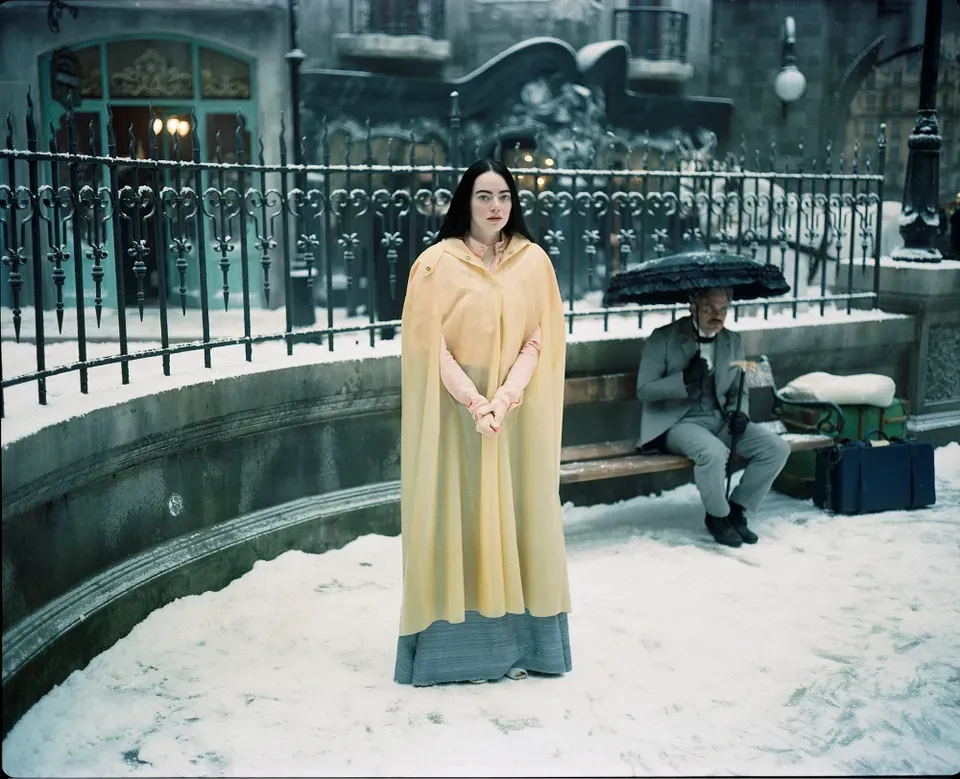'Poor Things' Shows Us How the Sausages Are Made, And Samples Them Too

Learning how to walk, talk and fornicate can be a complicated endeavor when your only points of reference are principled members of 'polite society'.
In Poor Things we follow the progress of Bella, a mysteriously impeded individual whose body is developed well into adulthood, but whose behavior resembles that of a differently abled infant.
Her legal guardian, a grotesquely disfigured surgeon, named Godwin, is disturbingly defiant of ethical limits, paradoxically maintaining the opinion that, "all human desire is immoral."
Together, 'God' and his experimental Bella share a roof with a panorama of random creations that run rampant, while decency is commanded to play dead. A dog with a duck's head barking in the kitchen, a chicken with a pig's face fluttering about the garden.
Original above all else, a film so eccentric, may get a pass to contradict itself for surrealistic purposes, but in doing so nullifies the transmission of a coherent message.
Just as the movie circumvents the laws of science, so too does it entitle itself to skipping the principles of human psychology; only relatable at times, exceedingly hypothetical throughout.
As Bella ages mentally, she wanders off into the real world, approaching human customs with a refreshingly blank slate of curiosity, often confounded by the sheer silliness of societal etiquette.
Although never fully overcoming her uncanny valley vibes, Emma Stone deserves credit for never breaking character, delivering a masterful interpretation of how an adult may interact within a community if never initially submitted to contemporary social conditioning.
It's interesting for about twenty minutes, until the activity of discovery repeats itself endlessly, feeling more like a Neutral Mask theater workshop than a gratifying work of fiction. The theatrical antics take center stage, slapstick routines drag on annoyingly, and the movie increasingly seems more fun for them to have filmed than for us to watch.
Bella's insatiable examination of the human condition eventually leads her to seek work at a brothel, sampling men of all shapes and sizes, but to the audience's confusion, responds to such intimacy with sociopathically low levels of emotional affectation.
The protagonist's 'sexual liberation' plays out like a game of blindfolded food tasting, as dozens of disease-ridden cretins perform their fetishes with her private parts, narrowing her human experience to that of a petri dish, rather than a breathing being with a sensitive soul.
Bella eagerly spins the roulette of trauma gradually accumulating more and more baggage, the gravity of the matter betrayed by her apparent nonchalance. Unafflicted by the consequences of her foolish quest for knowledge, her character embodies the analogy of touching the stove, yet somehow never getting burnt.
Nihilistic secondary characters join the fray as a sounding board to the film's pretentious suggestion that without conditioning we are shapeless in nature, free to experience without predetermined constraints, an idea which, respectfully, spits in the face of everything we intuit to be true about being alive.
And while a coat of wondrous wackiness protects Poor Things against objective criticism, it's the very same absurdist armor that weighs it down in the depths of meaninglessness; a mere existential rumination, offering only whimsical commentary off the cuff.
By attempting to do everything at once, director Yorgos Lanthimos fails to sufficiently polarize, resulting in a push-pull experience that entertains and drives insane in uneven proportion depending on who's watching.
Witty dialogue and creative science fiction can't counteract the extended displays of frivolity and lack of plausibility that compel the viewer from the sofa to the fridge for a snack without pressing pause. And like a wrapped up sugary snack, while delicious in appearance, the film falls short in nourishment.